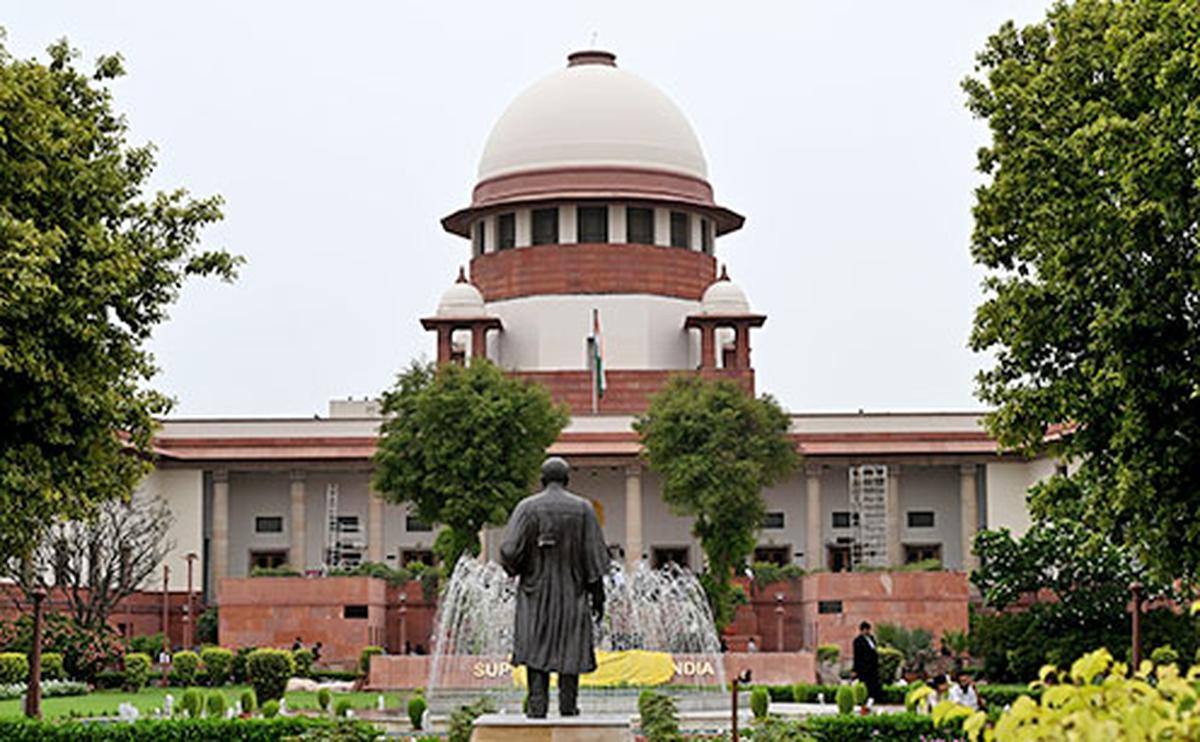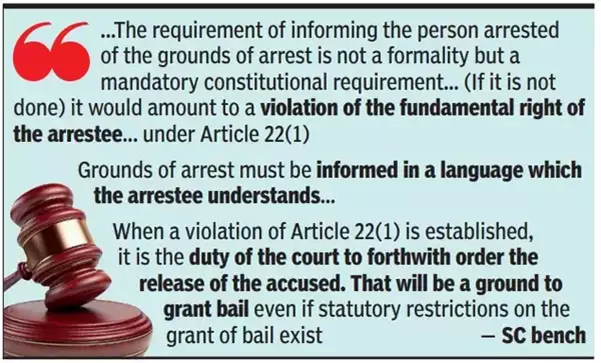- Courses
- GS Full Course 1 Year
- GS Full Course 2 Year
- GS Full Course 3 Year
- GS Full Course Till Selection
- Answer Alpha: Mains 2025 Mentorship
- MEP (Mains Enrichment Programme) Data, Facts
- Essay Target – 150+ Marks
- Online Program
- GS Recorded Course
- Polity
- Geography
- Economy
- Ancient, Medieval and Art & Culture AMAC
- Modern India, Post Independence & World History
- Environment
- Governance
- Science & Technology
- International Relations and Internal Security
- Disaster Management
- Ethics
- NCERT Current Affairs
- Indian Society and Social Issue
- NCERT- Science and Technology
- NCERT - Geography
- NCERT - Ancient History
- NCERT- World History
- NCERT Modern History
- CSAT
- 5 LAYERED ARJUNA Mentorship
- Public Administration Optional
- ABOUT US
- OUR TOPPERS
- TEST SERIES
- FREE STUDY MATERIAL
- VIDEOS
- CONTACT US
Article 22(1) : Supreme Court’s Ruling on Informing Grounds of Arrest
Article 22(1) : Supreme Court’s Ruling on Informing Grounds of Arrest
13-02-2025


- On February 9, 2025, the Supreme Court of India made an important judgment regarding the right of an arrested person to be informed about the grounds of their arrest.
- The Court said that it is a mandatory constitutional requirement, If this is not done, the arrest will be considered illegal.
Case Background:
- The ruling came in response to a case involving a man who was arrested by Haryana Police.
- The police did not inform him of the grounds for his arrest.
- The Supreme Court declared the arrest to be illegal and ordered the immediate release of the person.
Key Points of the Ruling:
- Fundamental Right:
- The Court said that the right to be informed of the grounds of arrest is protected under Article 22(1) of the Constitution.
- This Article is part of Fundamental Rights, and as such, must be strictly followed.
- If an arrested person is not informed about the grounds of arrest, it violates their right to liberty under Article 21, and makes the arrest illegal.
- Purposeful Communication:
- The Court also said that the communication of arrest grounds is not just a formality, but a necessary constitutional safeguard.
- This is to ensure that the arrested person is aware of why they have been arrested.
- Additionally, the Court said that friends or relatives (or any other nominated persons) of the arrested individual must also be informed about the grounds for arrest.
- This will help them take legal action to secure the release of the accused person.
- The arresting authorities must inform the arrested person about the grounds as soon as possible after the arrest but failing to do so makes the arrest unconstitutional and illegal.
- The Court also specified that the grounds for arrest must be communicated in a language the arrested person understands.
- The Court stated that the ideal way to communicate the grounds is in writing.
- While it is not mandatory to communicate in writing, following this method avoids confusion or disputes over whether the grounds were properly communicated.
- If the grounds of arrest are not provided, the arrest is considered invalid.
- Once the arrest is ruled illegal, the arrestee cannot remain in custody, even for a second longer.
- The police must follow the procedure laid out in Article 22 to protect the rights of the accused.
- Role of the Courts:
- The Judicial Magistrate responsible for remanding the arrested person must ensure that the police have followed Article 22(1) by informing the arrested person about the grounds.
- If it is found that the grounds were not communicated, the court must immediately order the release of the arrested person, even if there are restrictions on granting bail.
- Burden of Proof: If an arrested person claims that they were not informed about the grounds of their arrest, it is the responsibility of the police or investigating officer to prove that the communication was made correctly.
Article 22 of the Constitution of IndiaRights of an Arrested Person (Clause 1)
Production Before Magistrate (Clause 2)
Exceptions (Clause 3)
Preventive Detention (Clause 4)
Communication of Grounds for Detention (Clause 5)
|
|
Also Read |
|
UPSC Foundation Course |
|
| UPSC Monthly Magazine | CSAT Foundation Course |



